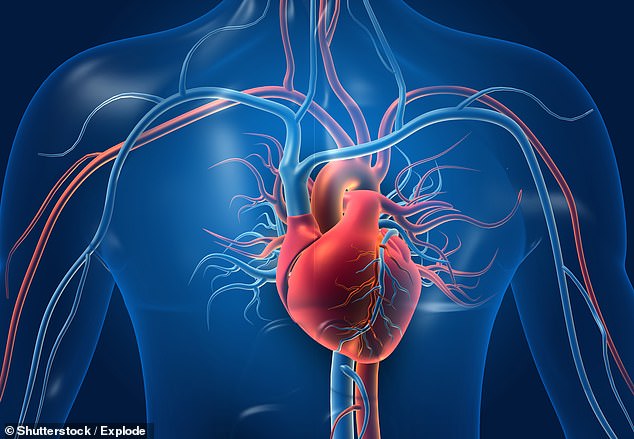Women with dilated cardiomyopathy are twice as likely as men to need hospitalisation or a transplant within two years of diagnosis, study finds
Women at high risk of a type of genetic heart disease that affects 250,000 Britons may have the severity of their condition 'underestimated' by doctors, researchers claim.
A study has found that women with dilated cardiomyopathy – which causes the heart's chambers to stretch, impeding its pumping action – are twice as likely as men to be hospitalized within two years of diagnosis or need a heart transplant. The findings came despite tests at the start of the study that showed the female participants were healthier overall. Experts say this would understandably lead to doctors being 'falsely reassured' that the women had a milder form of the disease, requiring fewer follow-up appointments and less medication.
But the research shows that women at high risk of complications from the condition – including potentially fatal heart failure – are flying under the radar.
A study has found that women with dilated cardiomyopathy – which causes the chambers of the heart to stretch, impeding pumping action – are twice as likely as men to be hospitalized or diagnosed within two years of diagnosis. need a heart transplant.
Dr. Paz Tayal, a cardiologist at Imperial College London who led the study, said: 'My concern is that we may be missing patients at higher risk. We would actually expect these women to do well if we followed them up, but what we found was the opposite. That paradox is the real puzzle.'
She adds: 'Despite what seemed like a better starting point, the women had twice as many complications – mainly problems related to heart failure – compared to male patients. And that happens quite early.
'Doctors should not necessarily be reassured by what appears to be milder disease in female patients. They may need more frequent follow-up and doctors should ensure they are using the full range of appropriate medications.”
In a third of cases, dilated cardiomyopathy is caused by defective genes, but can also be caused by viruses, an unhealthy lifestyle, medical problems such as high blood pressure or, rarely, pregnancy. Symptoms include shortness of breath, fatigue, and fluid retention in the legs. Most people can control the condition with medications, and in about half of patients the heart returns to a normal size.
But one in five will eventually develop serious complications, including fluid in the lungs, dangerous heart rhythms, heart failure – when the organ becomes irreversibly damaged and becomes increasingly unable to pump – or death within five years of diagnosis. Some may need a heart transplant or be fitted with a pump, called a ventricular assist device, that helps the heart beat properly.
The latest study is the first to conclusively show that women are more likely to develop these complications within the first two years after diagnosis. The study found that 8.6 percent of female participants were hospitalized due to these problems, compared to 4.4 percent of men. However, because they looked healthier, they were less likely to raise red flags for doctors.

The latest study is the first to convincingly demonstrate that women are more likely to suffer from these complications within the first two years after diagnosis. The study found that 8.6 percent of female participants were hospitalized due to these problems, compared to 4.4 percent of men. However, because they looked healthier, they were less likely to raise red flags for doctors
The women's hearts were less enlarged than those of the men, they had less scarring, known as fibrosis, in the walls of the heart – which can portend a poorer outlook – and they also had lower levels of troponin, a protein that can indicate a problem with heart function. the heart function.
The results were found to be the same regardless of whether women had a genetic trigger for the disease or whether it developed for other reasons.
'We don't know yet what causes this, but we think it has something to do specifically with female biology,' adds Dr Tayal. 'We need to do more research, but it is important that women with the condition and also doctors recognize that their risks may be greater than expected.'
The study adds to a growing body of research showing that women experience heart problems differently than men and should be treated differently.
For example, women who have a heart attack are more likely to experience fatigue and back pain than crushing chest pain. Heart disease – the leading cause of heart attack – is the biggest killer of women in Britain.
Dilated cardiomyopathy is diagnosed via a test to measure a protein called BNP in the blood, as well as an MRI or electrocardiogram scan. A genetic test may be performed if there is a family history of heart problems. If the result is positive, screening will be offered.
Four types of medications are given, including beta blockers and ACE inhibitors, along with medications that help reduce fluid retention and treat heart failure.
Dr. Tayal claims the 'vast majority' of patients with the condition responded well to treatment, adding: 'But we need to find out early who are the people who will be at greatest risk of complications, and do more work to find out why women are affected differently, but what we can do about it.”
